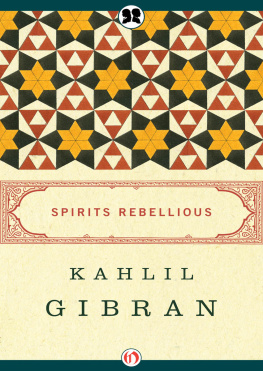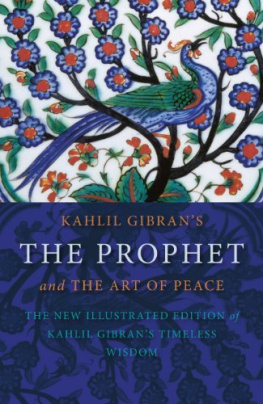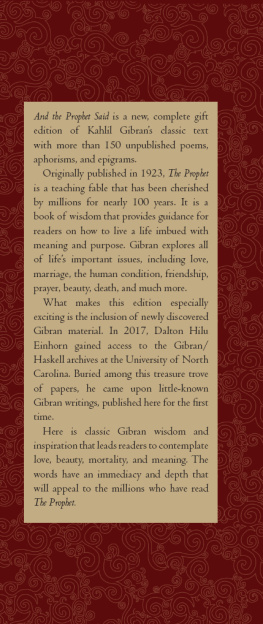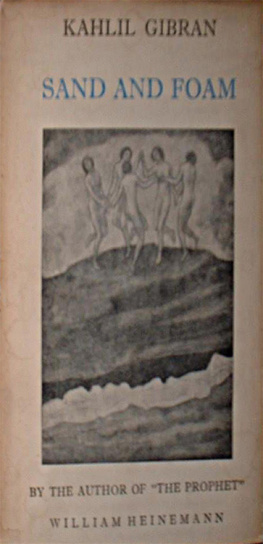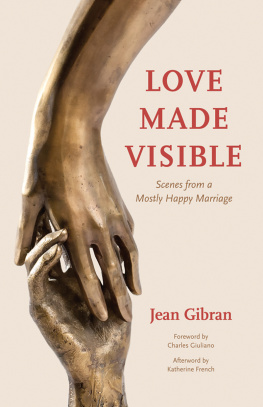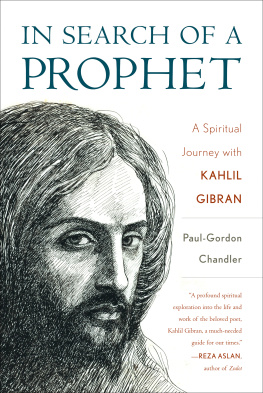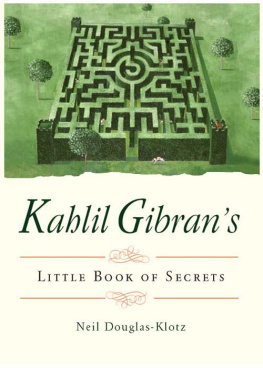KAHLIL GIBRAN
Spirits Rebellious
Translated by Anthony Rizcallah Ferris
Edited by Martin L. Wolf
Philosophical Library

Contents
Editors Preface
S OON after publication of the original Arabic of Spirits Rebellious at the turn of the century, considerable agitation and intrigue developed. The book was publicly burned in the Beirut market place by furious church and state officials who adjudged it poisonous, and fiercely dangerous to the peace of the country. Lebanon was then suffering virtual slavery under oppressive Turkish rule.
Gibrans bitter denunciation of both religious and political injustice prevailing at the time, brought also his anticipated exile from the country and excommunication from the church, although his parents were staunch Maronites. It was the story Khalil the Heretic, in particular, which drove the Sultan and his Emirs into trepidation, and caused nervous authorities in the entire Middle and Near East to examine into their governments.
Gibran was quietly pursuing painting with his friend Rodin in Paris when he learned of the ceremonial destruction of his book, and he merely expressed the thought that it was excellent cause for the issuance of a second edition.
In 1908 his exile was remanded, and the church embraced him without conciliation on his part. A mourner who witnessed the Gibran funeral procession in 1931, states that the ecclesiastical pageantry of the event was beyond description. Hundreds of priests and religious leaders, representing every denomination under Eastern skies, were in solemn attendance. Included were Maronites, Catholics, Shiites, Protestants, Mohammedans, Greek Orthodox, Jews, Sunnites, Druzes, and others. And to render complete Gibrans restoration to the fold of religion, he was buried in the grotto of the Monastery of Mar Sarkis in Bsherri, his childhood church.
M. L. W.
Madame Rose Hansie
M ISERABLE is the man who loves a woman and takes her for a wife, pouring at her feet the sweat of his skin and the blood of his body and the life of his heart, and placing in her hands the fruit of his toil and the revenue of his diligence; for when he slowly wakes up, he finds that the heart, which he endeavored to buy, is given away freely and in sincerity to another man for the enjoyment of its hidden secrets and deepest love. Miserable is the woman who arises from the inattentiveness and restlessness of youth and finds herself in the home of a man showering her with his glittering gold and precious gifts and according her all the honors and grace of lavish entertainment but unable to satisfy her soul with the heavenly wine which God pours from the eyes of a man into the heart of a woman.
I knew Rashid Bey Namaan since I was a youngster; he was a Lebanese, born and reared in the City of Beyrouth. Being a member of an old and rich family which preserved the tradition and glory of his ancestry, Rashid was fond of citing incidents that dealt mainly with the nobility of his forefathers. In his routine life he followed their beliefs and customs which, at that time, prevailed in the Middle East.
Rashid Bey Namaan was generous and good-hearted, but like many of the Syrians, looked only at the superficial things instead of reality. He never hearkened to the dictates of his heart, but busied himself in obeying the voices of his environment. He amused himself with shimmering objects that blinded his eyes and heart to lifes secrets; his soul was diverted away from an understanding of the law of nature, and to a temporary self-gratification. He was one of those men who hastened to confess their love or disgust to the people, then regretted their impulsiveness when it was too late for recall. And then shame and ridicule befell them, instead of pardon or sanction.
These are the characteristics that prompted Rashid Bey Namaan to marry Rose Hanie far before her soul embraced his soul in the shadow of the true love that makes union a paradise.
* * * *
After a few years of absence, I returned to the City of Beyrouth. As I went to visit Rashid Bey Namaan, I found him pale and thin. On his face one could see the spectre of bitter disappointment; his sorrowful eyes bespoke his crushed heart and melancholy soul. I was curious to find the cause for his miserable plight; however, I did not hesitate to ask for explanation and said, What became of you, Rashid? Where is the radiant smile and the happy countenance that accompanied you since childhood? Has death taken away from you a dear friend? Or have the black nights stolen from you the gold you have amassed during the white days? In the name of friendship, tell me what is causing this sadness of heart and weakness of body?
He looked at me ruefully, as if I had revived to him some secluded images of beautiful days. With a distressed and faltering voice he responded, When a person loses a friend, he consoles himself with the many other friends about him, and if he loses his gold, he meditates for a while and casts misfortune from his mind, especially when he finds himself healthy and still layyden with ambition. But when a man loses the ease of his heart, where can he find comfort, and with what can he replace it? What mind can master it? When Death strikes close by, you will suffer. But when the day and night pass, you will feel the smooth touch of the soft fingers of Life; then you will smile and rejoice.
Destiny comes suddenly, bringing concern; she stares at you with horrible eyes and clutches you at the throat with sharp fingers and hurls you to the ground and tramples upon you with ironclad feet; then she laughs and walks away, but later regrets her actions and asks you through good fortune to forgive her. She stretches forth her silky hand and lifts you high and sings to you the Song of Hope and causes you to lose your cares. She creates in you a new zest for confidence and ambition. If your lot in life is a beautiful bird that you love dearly, you gladly feed to him the seeds of your inner self, and make your heart his cage and your soul his nest. But while you are affectionately admiring him and looking upon him with the eyes of love, he escapes from your hands and flies very high; then he descends and enters into another cage and never comes back to you. What can you do? Where can you find patience and condolence? How can you revive your hopes and dreams? What power can still your turbulent heart?
Having uttered these words with a choking voice and suffering spirit, Rashid Bey Namaan stood shaking like a reed between the north and south wind. He extended his hands as if to grasp something with his bent fingers and destroy it. His wrinkled face was livid, his eyes grew larger as he stared a few moments, and it seemed to him as if he saw a demon appearing from nonexistence to take him away; then he fixed his eyes on mine and his appearance suddenly changed; his anger was converted into keen suffering and distress, and he cried out saying, It is the womanthe woman whom I rescued from between the deathly paws of poverty; I opened my coffers to her and made her envied by all women for the beautiful raiment and precious gems and magnificent carriages drawn by spirited horses; the woman whom my heart has loved and at whose feet I poured my affection; the woman, to whom I was a true friend, sincere companion and a faithful husband; the woman who betrayed me and departed me for another man to share with him destitution and partake his evil bread, kneaded with shame and mixed with disgrace. The woman I loved; the beautiful bird whom I fed, and to whom I made my heart a cage, and my soul a nest, has escaped from my hands and entered into another cage; that pure angel, who resided in the paradise of my affection and love, now appears to me as a horrible demon, descended into the darkness to suffer for her sin and cause me to suffer on earth for her crime.

